Key Takeaway:
To convert Spotify music to AAC format, here are three effective methods: using the professional software TuneFab Spotify Music Converter, online tools, and audio recording tools.
Among them, TuneFab Spotify Music Converter excels in high audio quality, efficient batch Spotify to AAC conversion, ID3 tag preservation, and stable performance. With it, you can enjoy a fast and smooth Spotify to AAC conversion.
100% Secure
100% Secure
Spotify is perfect for streaming music, but what if you want to play your favorite songs on a device that doesn't support Spotify, or keep them forever without worrying about your subscription? Unfortunately, Spotify's music files are encrypted in OGG Vorbis format, restricting direct playback on non-supported devices.
If you need a more compatible, high-quality format like AAC - commonly supported by iPhones, iPads, iTunes, car audio systems, and smart speakers - you'll need to convert Spotify songs manually. Since Spotify doesn't offer this feature natively, many users are left wondering: how can I convert Spotify music to AAC easily and legally?
In this guide, we'll walk you through 3 reliable methods to convert Spotify music to AAC, finally putting you in full control of your music experience. Let's get started!
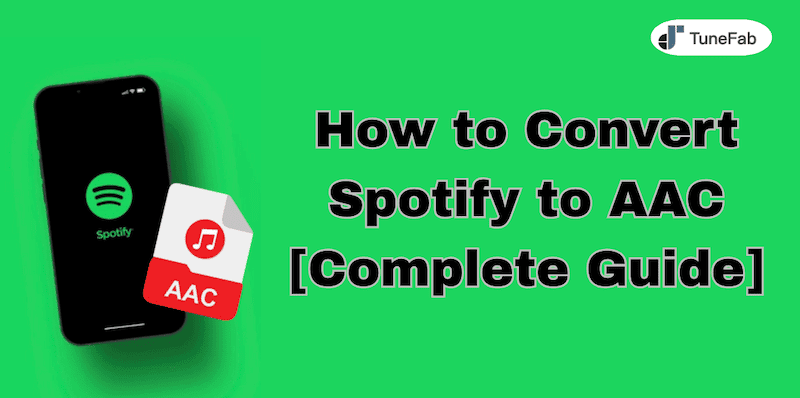
You May Also Like:
How to Convert Spotify to FLAC Losslessly (Online/Free/Paid)
Why Convert Spotify Music to AAC Format?
Before diving into the actual methods, let's quickly explore why AAC is worth your attention. AAC, short for Advanced Audio Coding, is a widely used audio format known for delivering superior sound quality compared to MP3, especially at similar or lower bitrates.
Unlike Spotify's original format, OGG Vorbis -which is optimized primarily for streaming and protected to restrict direct playback - AAC provides greater freedom by ensuring broad compatibility across numerous devices, including Apple products, gaming consoles, smart speakers, and car stereos.
In short, converting Spotify music to AAC gives you more control over how, where, and when you listen, without being locked into a single platform. Next, let's explore the most efficient way to make that conversion happen.
Method 1. Convert Spotify to AAC Using Third-Party Tools [Best Way]
Spotify encrypts its songs in OGG format, so they can't be played or saved as common audio files like MP3 or AAC. To convert Spotify music to AAC for offline playback on any device, you need a professional third-party music converter tool.
TuneFab Spotify Music Converter is a viable tool that allows you to download any Spotify songs, albums, playlists, and podcasts into plain formats, even without a Premium subscription. It supports multiple output formats, including AAC (commonly stored as .m4a files). With a built-in Spotify Web Player, TuneFab makes it easy to batch Spotify to AAC conversions while preserving original sound quality, and keeping metadata intact, enabling you to manage your music seamlessly across various devices.
Key Features of TuneFab Spotify Music Converter:
- Download and convert Spotify songs to MP3/M4A/FLAC/WAV/AIFF/ALAC without needing Spotify Premium.
- Integrate the Spotify Web Player and enable effortless drag-and-drop downloads.
- Offer speeds up to 35X faster with batch downloading feature for high efficiency.
- Maintain original ID3 tags, including artist names, album art, song titles, etc.
- Allow you to choose lossless quality conversion and customize sample rates and bitrates.
With TuneFab Spotify Music Converter, converting songs from Spotify to AAC format (saved as .m4a) is quick and straightforward. Here's how to get started:
Step 1. Launch TuneFab and Log in to Spotify
Open the TuneFab Spotify Music Converter on your computer, and you'll get a built-in Spotify Web Player. Click "Log In" at the top right and enter your Spotify account credentials to access your music library.
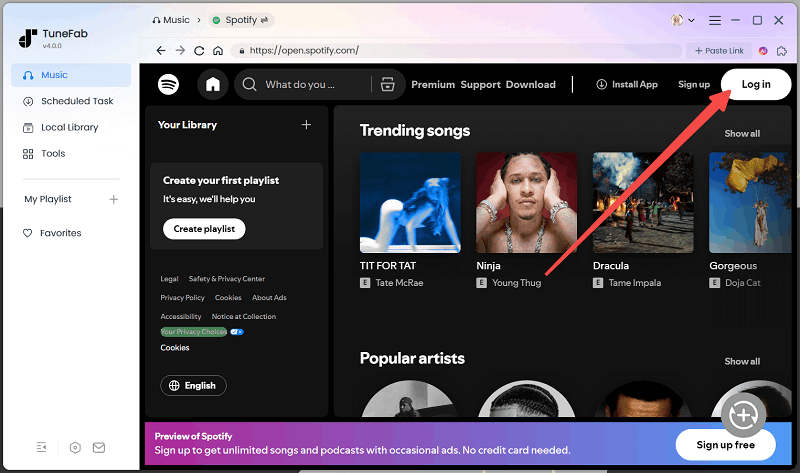
Step 2. Select the Songs You Want to Convert
Browse through the Spotify library to find the songs, playlists, albums, or podcasts you want to convert. Click the "Add to Convert" button to add them to the conversion queue.
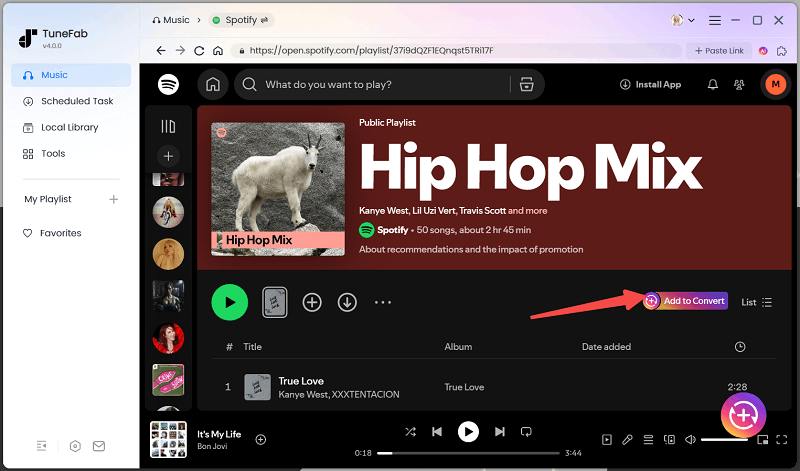
Step 3. Select AAC as the Output Format
In the pop-up, set the output format of M4A(AAC) for all tracks. Also, you can change the bitrate and sample rate to your preferences.
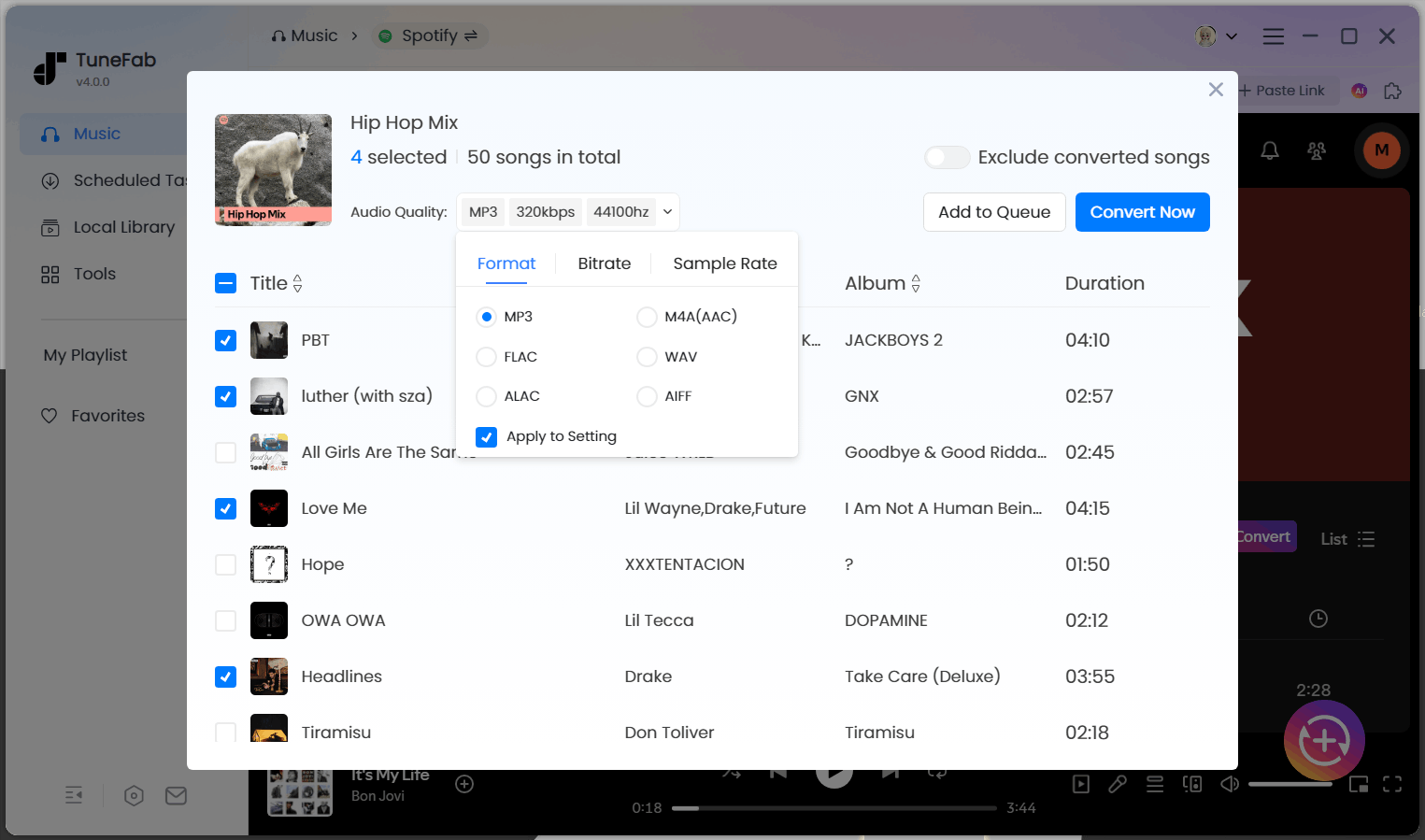
Step 4. Start the Spotify to AAC Conversion Process
Click "Convert Now" to start the conversion once you've configured your settings. You can monitor the progress in "Scheduled Task" and stop the conversion at any time by clicking the "Pause All" button.
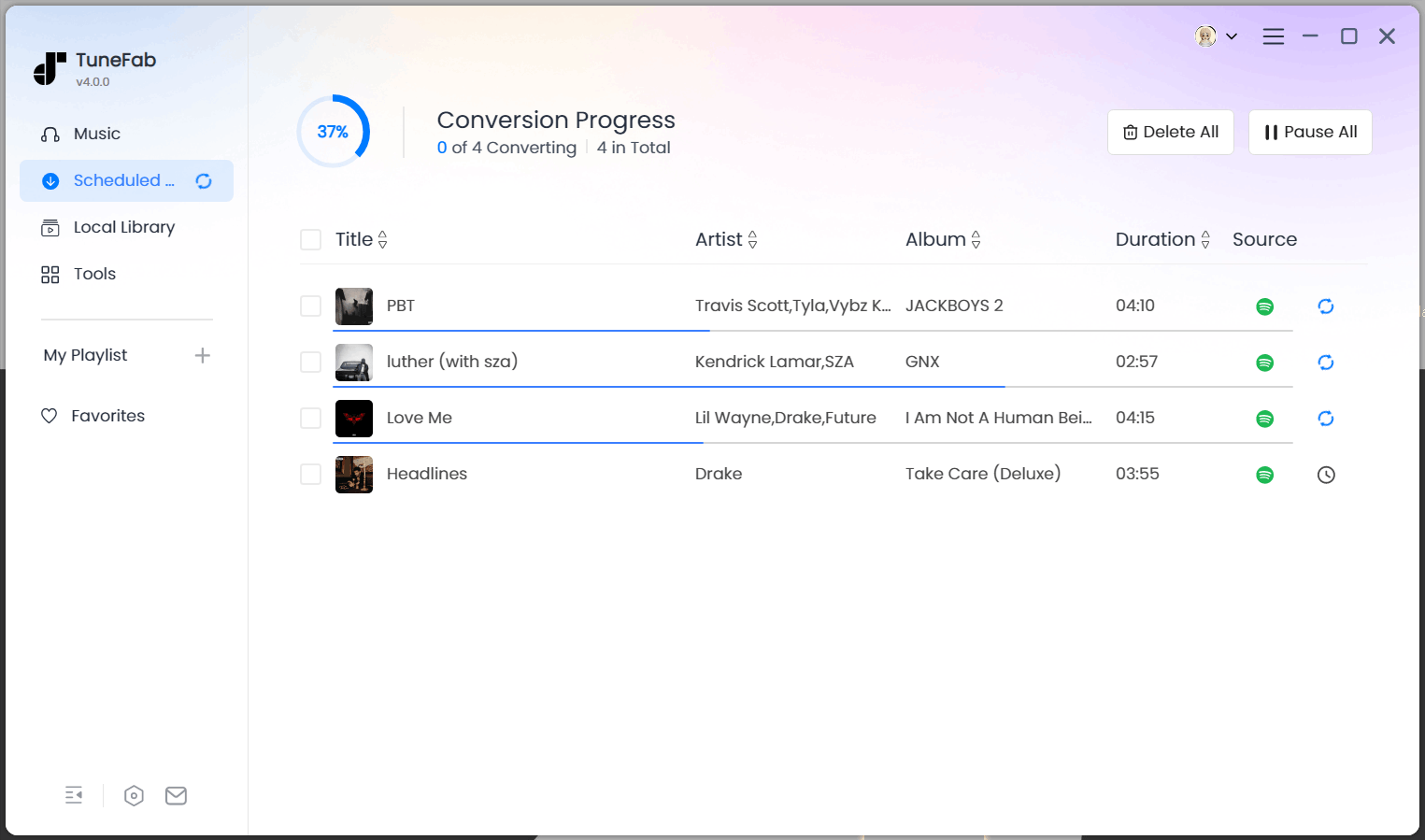
Step 5. Access the Converted M4A Files
Navigate to the "Local Library" section after the conversion. You can now play these converted AAC Spotify files within TuneFab or transfer them to any device for offline listening.
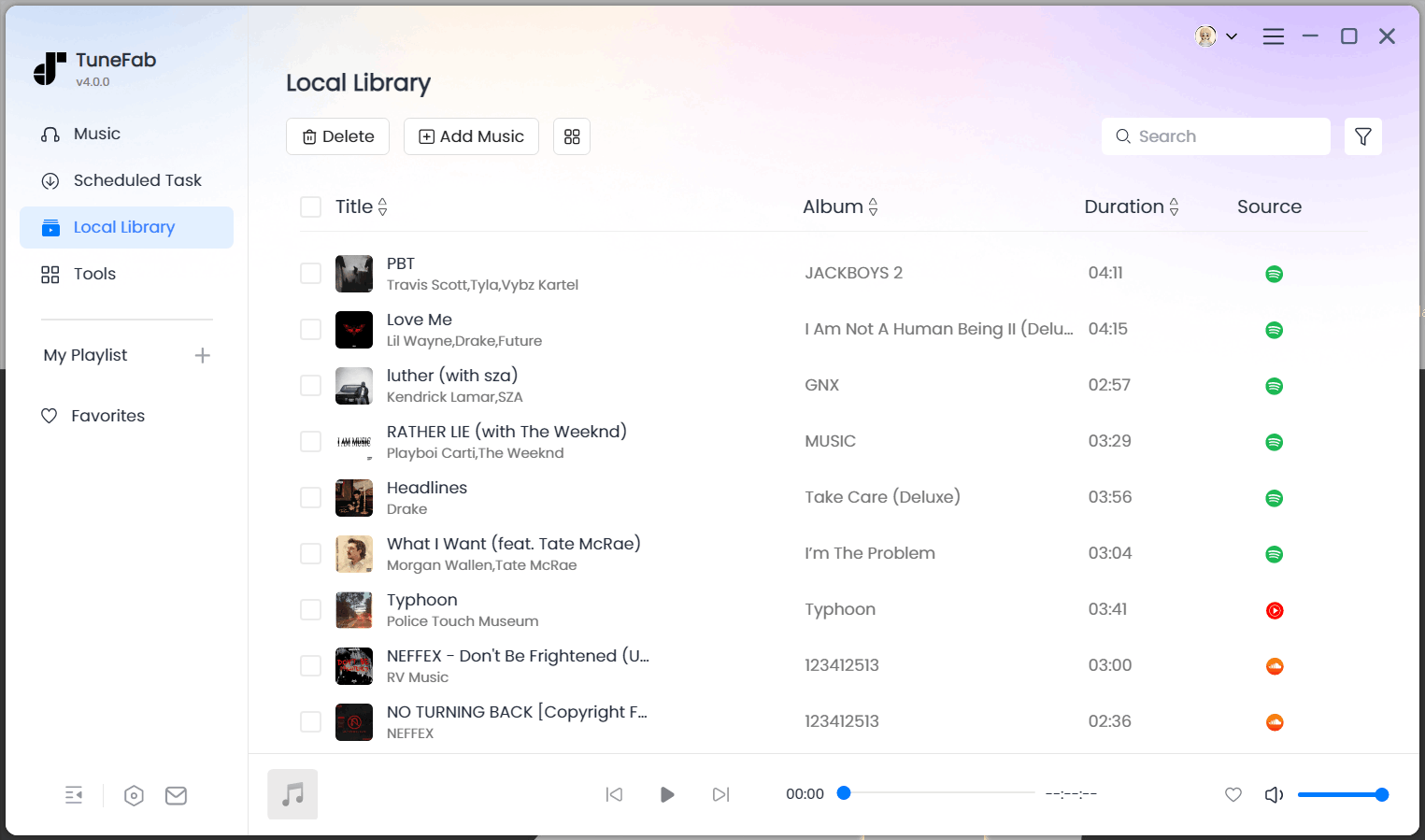
Method 2. Convert Spotify to AAC via Online Tools
While desktop converters like TuneFab offer the most reliable and comprehensive results, some users might prefer an easier, quicker solution, especially when using a mobile device or when trying to avoid installing software. Although no single online tool can convert Spotify directly to AAC, you can achieve the same result using a two-step workaround with SpotifyDown and CloudConvert, both of which are free and web-based.
This method is best for casual users who want to convert a few songs rather than entire playlists or albums. However, it comes with several trade-offs, such as manual file management, quality limitations, and lack of metadata preservation. Here's how to do it:
Section 1. Download Spotify Songs as MP3 Using SpotifyDown
1. Visit SpotifyDown.com on your browser.
2. Copy the link of the Spotify song or playlist you want to download.
3. Paste the link into the input box on SpotifyDown and click the "Download" button.
4. The tool will process the track and provide an MP3 download link.
5. Save the MP3 file to your device (desktop or mobile).
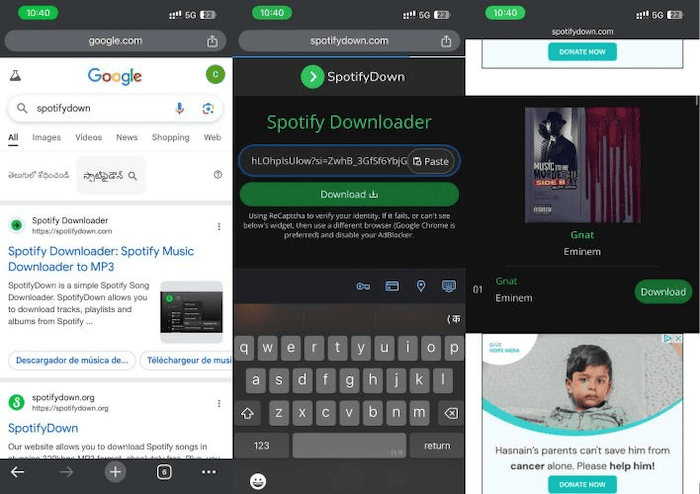
Note: SpotifyDown may not support all tracks and typically provides limited audio quality. You may also encounter ads or download errors with certain songs. For users who need a more stable, high-quality, and long-term solution, a professional tool like TuneFab Spotify Music Converter is highly recommended.
Section 2. Convert MP3 to AAC Using CloudConvert
1. Go to CloudConvert.com/mp3-to-aac.
2. Click "Select File" and upload the MP3 file you downloaded from SpotifyDown.
3. Under output format, make sure AAC (.m4a) is selected.
4. Optionally, click the wrench icon to set advanced options (e.g., bitrate).
5. Click "Convert" to start the conversion process.
6. Once finished, click "Download" to save the AAC (.m4a) file to your device.
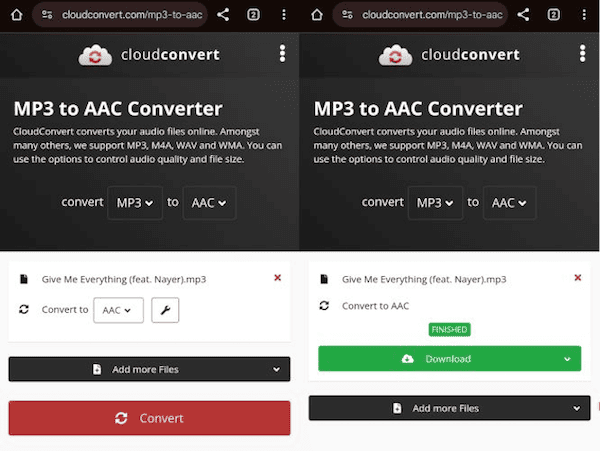
Method 3. Convert Spotify to AAC with Audio Recorder Tools
If you're looking for a simple, cost-effective way to convert Spotify music to AAC without using specialized conversion software, audio recording tools can be a viable option. This method works by capturing the sound directly from your computer's audio output while Spotify plays, essentially "recording" the music in real time.
While this method can be a free and accessible option for occasional use, it's not the most efficient solution for anyone looking to convert large playlists or maintain consistent, high-quality output. For better results, especially for frequent use or large collections, consider using a dedicated desktop tool like TuneFab Spotify Music Converter.
Follow these simple steps to convert Spotify to AAC using EaseUS RecExperts recorder:
Step 1. Download and install EaseUS RecExperts from the official website, and then open the application on your computer.
Step 2. Click on the gear-shaped "Settings" icon to open the preferences window. Navigate to the "Audio" tab, select "AAC" as the output format, and adjust other settings such as bitrate and sampling rate according to your preferences.
Step 3. On the main interface, click on the "Audio" option. Choose "System sound" to record audio from Spotify.
Step 4. Play the desired track or playlist on Spotify. Click the "REC" button in EaseUS RecExperts to begin recording.
Step 5. Once the track has finished playing, click the red square "Stop" button. The recorded audio will be saved in the designated folder, accessible through the "Recordings" section.
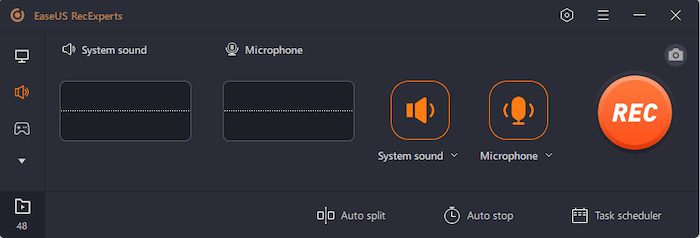
FAQ about Spotify to AAC Conversion
Will converting to AAC reduce the audio quality?
AAC is a lossy format, but it's designed to maintain high sound quality at lower bitrates. In most cases, converting from Spotify's standard stream to AAC at 256kbps will offer a listening experience very close to the original.
Can I convert entire Spotify playlists to AAC at once?
Yes, third-party converters like TuneFab Spotify Music Converter support batch conversions, enabling you to effortlessly convert entire playlists, albums, or podcasts to AAC format simultaneously, saving you considerable time and effort.
Are AAC files compatible with Android devices?
Absolutely. AAC is widely compatible with Android smartphones, tablets, and music players, making it a versatile choice for seamless music playback across various devices.
Can my converted files sync to iTunes or Apple Music?
Absolutely. Since AAC is Apple's preferred format, your converted M4A files will integrate seamlessly with iTunes, and you can sync them to your iPhone, iPad, or Apple Music library.
Conclusion
In this guide, we've explored 3 methods for converting Spotify to AAC. Using dedicated Spotify Converters is the most efficient and comprehensive solution, providing high-quality conversions, batch processing, and metadata retention. Using online tools offers a quick and free option but is limited by lower audio quality, lack of batch processing, and the inability to handle DRM-protected content. Using audio recording tools is another free solution, but it requires real-time recording and manual intervention, making it time-consuming and less suitable for large playlists.
For those seeking a reliable, high-quality, and fast conversion process, TuneFab Spotify Music Converter is the clear choice. It allows you to convert Spotify music to AAC without the need for a Spotify Premium account, preserves metadata, and provides flexibility in output settings. With its user-friendly interface and no-loss audio quality, TuneFab ensures that you can create the perfect offline library quickly and efficiently, without the limitations of other methods.



